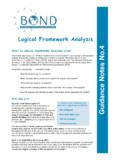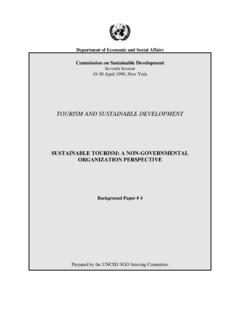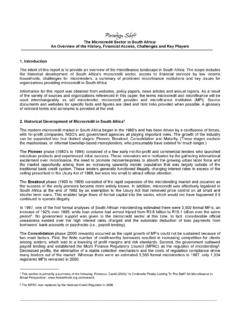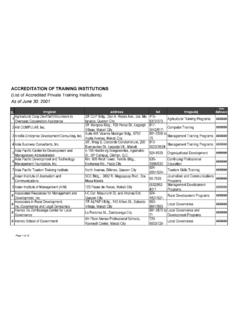Transcription of United Nations New York and Geneva, 2006 - GDRC
1 United Nations New York and Geneva, 2006. T. LS EN. N G ELOP. M. E V R. D IE. O SS. D. N GO Y. I N G L I T. AT A B I. D E B NT. O U. AC C. de ll B e n y Je m b he ed by t uc re prod ervice a S. o ssiers iaison tD lL. lop men rnmenta e ve Dev n-Go No UN. 06. 20. s ti on d Na ite Un UN-NGLS Development Dossier Debating NGO. Accountability by Jem Bendell United Nations New York and Geneva, 2006. The responsibility for opinions, views and ideas expressed in this Development Dossier rests solely with the author, and publication does not constitute an endorsement by the United Nations Non- Governmental Liaison Service or any other part of the UN system of the opinions expressed. The designations used do not imply the expression of any opinion whatsoever on the part of NGLS or any part of the United Nations system concerning the legal status of any country, area or territory or its authorities, or concerning the delimitation of its frontiers.
2 This publication is thirteenth in the series of NGLS Development Dossiers. They are published for non-governmental and civil society organizations and others interested in the institutions, policies, and activities of the UN system and the issues on the UN's agenda, including development, human rights, peace and disarmament. Organizations are welcome to use them in their own work and infor- mation activities. Please credit NGLS and provide a copy. UNCTAD/NGLS/ 2006/1. Published in August 2006 by UN Non-Governmental Liaison (NGLS). Palais des Nations , CH-1211 Geneva 10, Switzerland Room DC1-1106, United Nations , New York NY 10017, United States ii TABLE OF CONTENTS. List of Abbreviations iv Acknowledgements vi Preface vii Introduction ix Chapter 1: Defining Organizational Accountability 1.
3 Chapter 2: NGO Accountability and International Development Assistance 9. Initial Responses to Accountability Challenges 13. Participation and Accountability 20. Advocacy and Accountability 23. Chapter 3: NGO Accountability and Global Governance 31. Factors Influencing the Validity of Voice 36. The United Nations System, NGOs and Accountability 45. Chapter 4: New Regulations and Initiatives on NGO Accountability 55. Voluntary NGO Accountability Mechanisms 58. Chapter 5: Donor Accountability 67. Chapter 6: Towards a Broader Perspective 75. Conclusion 81. Annex I: End Notes 83. Bibliography 85. iii List of Abbreviations AccountAbility Institute of Social and Ethical Accountability AEI American Enterprise Institute AU African Union CEO Chief Executive Officer CSO Civil Society Organization DFID UK Department for International Development EU European Union FOE Friends of the Earth GAP Global Accountability Project GATS General Agreement on Trade in Services HAP Human Accountability Project ICANN Internet Corporation for Assigned Names and Numbers ICBL International Campaign to Ban Landmines ICFTU International Confederation of Free Trade Unions IFI International Financial Institution IGO Intergovernmental Organization ILO International Labour Organization IMF International Monetary Fund ISO International Organization for Standardization IUCN International Union for the
4 Conservation of Nature NAFTA North American Free Trade Area NGLS UN Non-Governmental Liaison Service NGO Non-Governmental Organization ODA Official Development Assistance OECD-DAC Organisation for Economic Co-operation and Development: Development Assistance Committee PCNC Philippine Council for NGO Certification PIW Public Interest Watch SGS Soci t G n rale de Surveillance UDHR Universal Declaration of Human Rights iv List of Abbreviations UAE United Arab Emirates UN United Nations UNAIDS Joint United Nations Programme on HIV/AIDS. UNDP United Nations Development Programme UNDPI UN's Department of Public Information UNGA United Nations General Assembly US United States USAID United States Agency for International Development WCC World Council of Churches WDM World Development Movement WSF World Social Forum WTO World Trade Organization WWF World Wide Fund for Nature v ACKNOWLEDGEMENTS.
5 My thanks to Tony Hill for commissioning this work and being patient with its development; to Phyllida Cox for research assistance which helped me to dip in and (crucially) out of a variety of academ- ic disciplines; to Lisa Jordan, Nora McKeon, Klebert Ghmire, Alan Fowler and Peter Utting for comments on drafts; and to Dhiren Bahl and Beth Peoch for working on the text. Jem Bendell Geneva, August 2006. vi PREFACE. As this Dossier goes to press, the heads of 11 of the world's leading human rights, environmental and social development international organizations have publicly endorsed the first global accountability charter for the non-profit sector. Signed by ActionAid International, Amnesty International, CIVICUS World Alliance for Citizen Participation, Consumers International, Greenpeace International, Oxfam International, the International Save the Children Alliance, Survival International, International Federation Terre des Hommes, Transparency International and World YWCA, the International Non-Governmental Organizations Accountability Charter sets out core values and operating principles for international NGOs, includ- ing good governance and management; fundraising and multi-stake- holder engagement.
6 It also makes specific reference to respect for universal principles (such as the Universal Declaration of Human Rights), independence, responsible advocacy, effective programmes, non-discrimination, transparency and ethical fundraising. Next steps will involve putting in place a robust system for reporting and review of the Charter so that it can be improved and updated in light of experience. With greater visibility and influence comes responsibility. In the case of NGOs this maxim could be better phrased that with a higher profile come louder calls for greater responsibility. Concerns about the role and accountability of NGOs have been voiced from different quarters in recent years. Some donors, governments, corporations, and international agencies raise important questions about the effec- tiveness of NGO work and the legitimacy of their advocacy.
7 Some NGOs have also recognized the need to ensure good practice in the wider voluntary sector. For this emerging agenda to lead to positive development outcomes, we need to ask what initiatives will improve the accountability of all institutions to the people whose lives they shape, and what initiatives could serve merely to undermine NGOs'. vii Debating NGO Accountability useful and largely accepted role in holding business and government accountable for their actions. To do this, this Development Dossier, Debating NGO Accountability by Dr. Jem Bendell, puts democra- cy and human rights firmly at the centre of the debate about NGO. accountability. The implications of this democratic accountability . approach are significant, as it encourages us to consider with equal energy the accountability of those not-for-profit organizations that have often been ignored by NGO accountability debates and initia- tives, such as charitable foundations, religious institutions and pro- fessional associations.
8 Therefore, Dr. Bendell suggests within the NGO accountability agenda may lie the seeds of a renewal of civil society's role in both embodying and shaping democracy. Debating NGO Accountability is the thirteenth publication in NGLS's Development Dossier series. The series seek to contribute to the ongoing dialogue of the international development community through dissemination of challenging analyses and reflections from independent observers on current issues on the international devel- opment agenda. Recent issues in the series have addressed conflict prevention and peacebuilding, the history of women's organizations at the UN, and the debate on corporate social and environmental responsibility. Currently under production is a Dossier on the poten- tials and challenges posed by the growing use of nanotechnology.
9 NGLS is very pleased to publish this latest Development Dossier on a topic of crucial importance to its constituencies within both civil society and the UN system. NGLS would welcome any observations and comments you may have on the NGO accountability debate. Tony Hill Coordinator UN Non-Governmental Liaison Service (NGLS). Geneva, August 2006. viii INTRODUCTION. Read the newspapers or switch on the television, and you will soon hear a story about the bad behaviour of someone in government or business. In a world of accounting scandals and scurrilous politi- cians, perhaps the only thing we can trust in is that our trust will be breached. The desire for power is often said to be the cause of this social malaise and so, conversely, we may anticipate integrity in those who do not desire such power for themselves, but to help oth- ers.
10 Many of us have a natural inclination for trusting those who work for the benefit of others. Yet a higher expectation makes for a harder fall. While bad behaviour is no longer much of a story . hypocrisy is. The massive relief effort by non-governmental organizations (NGOs) after the 2004 Asian Tsunami was testimony to the skills and power of many NGOs. However, it also heightened concerns about opportunities for the misuse and abuse of humanitarian funds. Within months there were protests in Sri Lanka against corrupt aid distribution (Agence France Presse, 2005), and questions about the will of the government to address this challenge (Perera, 2005). In Indonesia, even the coordinator of an NGO tasked with challenging corruption in the relief effort, was arrested by police for alleged cor- ruption, raising doubts about both NGOs and law enforcement authorities (Deutsche Presse-Agentur, 2005).






